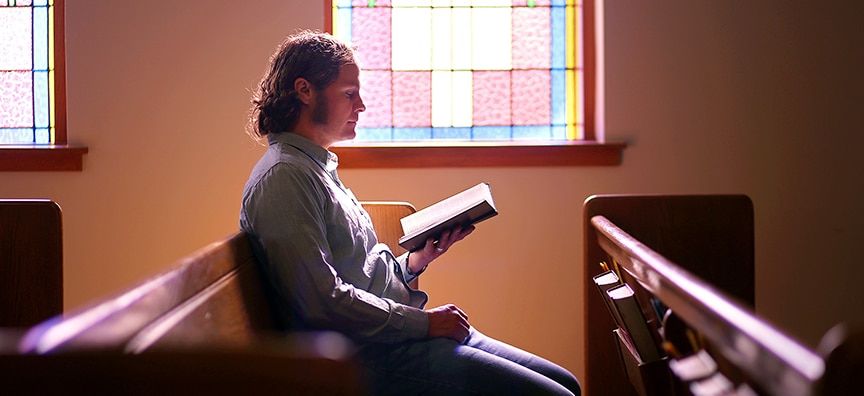America’s Mental State

I have noticed in my years here at Southwest Radio Church that donations vary according to economic conditions of our country, but not in a way that we would think. Constantly, every four years during the presidential election donations are much less than other years. However, in the past few years a pattern has developed that is very disturbing. Today, our economy is red-hot, so you would think that donations would be up. However, that is not the case, so I wanted to investigate to read what others thought about this phenomenon.
In the Old Testament Israel had a seesaw relationship with God that depended on their economy. By that I mean that when they prospered, they tended to forget God and move into the direction of idols that represented sensual pleasure and fewer restrictions on their lifestyle. When this happened, God would remove the bounty they were enjoying and often punish them with cruel leadership that brought them back into bondage, often a foreign power that knew not their God.
This revolving door relationship with God happened over and over again in the books of Kings and Chronicles. Are we only a year away from God’s judgment to end our run of economic prosperity? I believe that God has given us a window of opportunity by giving us a leader, President Trump, to correct our course or give us over to a cruel and unjust system of government that will destroy our country. We must remember that we cannot thumb our nose at God and expect to continue to receive the gifts that only God can bestow. Will we, can we, learn from history? The following may give us a glimpse of what we can expect.
Is there any correlation between the period of The Great Depression and today’s mental and spiritual state. We tend to believe that the Wall Street Crash of 1929 was the main reason for the state of mental health during the period between 1930 and 1933. However, when we look at the statistics presented by the National Institutes of Health (www.ncbinim.gov) we are surprised by what we read. I am quoting a section of this article because of its complexity. Please note my added emphasized sections.
“Recent events highlight the importance of examining the impact of economic downturns on population health. The Great Depression of the 1930s was the most important economic downturn in the U.S. in the twentieth century. We used historical life expectancy and mortality data to examine associations of economic growth with population health for the period 1920–1940. We conducted descriptive analyses of trends and examined associations between annual changes in health indicators and annual changes in economic activity using correlations and regression models. Population health did not decline and indeed generally improved during the four years of the Great Depression, 1930–1933, with mortality decreasing for almost all ages, and life expectancy increasing by several years in males, females, whites, and nonwhites. For most age groups, mortality tended to peak during years of strong economic expansion (such as 1923, 1926, 1929, and 1936–1937). In contrast, the recessions of 1921, 1930–1933, and 1938 coincided with declines in mortality and gains in life expectancy. The only exception was suicide mortality which increased during the Great Depression, but accounted for less than 2% of deaths. Correlation and regression analyses confirmed a significant negative effect of economic expansions on health gains. The evolution of population health during the years 1920–1940 confirms the counterintuitive hypothesis that, as in other historical periods and market economies, population health tends to evolve better during recessions than in expansions.”
The article adds that during the years of 1929–1933 non-white males gained eight years of life expectancy from 45.7 years to 53.8 years and female non-whites from 47.8 to 56.0 years during the same period. “In economics, the terms ‘recession’ and ‘depression’ refer to a decline in economic activity, with ‘depression’ implying a much more severe (longer and deeper) decline, involving high levels of unemployment” (www.ncbinim.gov). The years after the Great Depression saw an economic growth up to and including WWII, but a decline in spiritual growth. So, is there a correlation between economic growth and spiritual growth? For instance, divorce increased dramatically after the war and became socially acceptable during an economic boom.
“The empirical evidence supports, to a degree, the secularization thesis which holds that with increased income, people tend to become less religious (as measured by religious attendance and religious beliefs). Economic development causes religion to play a lesser role in the political process and in policymaking, in the legal process, as well as in social arrangements (marriages, friendships, colleagues). There are four primary indicators of the influence of economic development on religion. Economic development implies a rising opportunity cost of participating in religious services and prayer” (www.hoover.org).
The Hoover Institute gives the following four reasons for their consensus. First, education: The more educated a person is the more likely he is to turn to science for explanations of natural phenomena. (In other words, his social standings may suffer if he accepts the Bible as being the answers to his questions. He may therefore turn to science because of his stand with academia.) Second, value of time: An economic upturn may result in an increase of personal income, thereby time becomes more valuable and may result in spending less time in church and prayer. Third: urbanization: Because of economic growth, religion will have to compete with less religious activities and focus more on leisure time activities such as symphony, theatre, museums, and non-religious volunteer activities. Fourth: GNP: studies show that per capita gross national product has a negative effect on religious activities. For example, the richer a nation becomes the need for God is lessened because our needs are being met without spending time in His work. The nation, including professed Christians, has a tendency to forget God in time of plenty.
Can we expect a great economy today in America to forecast a downward trend in Christian participation and giving to churches and Christian ministries and missions? We, along with many other Christian ministries, are experiencing just that. Some Christian leaders look for and believe that America will experience another “Great Awakening” in the near future. Egyptians, along with citizens of other countries that are experiencing this phenomena, are poor and subjects of slavery.
Christianity Today states: “Christianity is on the decline, Americans have given up on God, and the ‘Nones’—those who have no religious ties—are on the rise. It is indeed true that parts of the Christian Church in America are struggling, while a growing number of Americans are far from God” (www.christianitytoday.com). Why is Christianity on the decline in America? This is the greatest Christian society in the history of the world, but we have come too close to the world.
Pastors must take the lion’s share of the blame. Too many pastors graduate from seminaries that no longer teach that the Bible is true and then teach the same from their pulpits. This belief is passed onto society in general, which removes core values such as faith and a dependence on God. That makes it much easier therefore to place trust in themselves to solve their own problems. Many megachurch pastors are nothing more than entertainers which push self-help scenarios.
There is nothing wrong with money and attaining worth. It is not the money—it is the love of money! “For the love of money is the root of all evil: which while some coveted after, they have erred from the faith, and pierced themselves through with many sorrows” (1 Tim.1:10). In fact, if we don’t make money in this society we are also condemned, “But if any provide not for his own, and specially for those of his own house, he hath denied the faith, and is worse than an infidel” (1 Tim. 5:8). Therefore, it is not the making but the dispensing.
God has blessed this nation more than any other nation of our time, but that blessing is in jeopardy of being taken away. If America does not honor God and give Him the credit for our economy and position in this world, He can also take it away in the form of a recession or depression. We must not sit silent and allow the ungodly to continue to prosper in our nation. We have sent idolators, the ungodly, and unbelievers to Washington who don’t even believe that Christ is the Son of God. God cannot continue to bless while He is being blasphemed.
I believe that one of the reasons that God is blessing America is because of our stand for Israel. However, anti-Semitism is growing stronger in America. President Trump has sent a strong message of support to the world concerning America’s stand with Israel. This support of God’s land could vanish with a change in the White House. The alternative could be the nail in the coffin in America’s last stand. That nail could well be “socialism” which will certainly cause this nation and it economy to collapse. Would that bring us back to God?
“If my people, which are called by my name, shall humble themselves, and pray, and seek my face, and turn from their wicked ways; then will I hear from heaven, and will forgive their sin, and will heal their land” (2 Chron. 7:14). If the past statistics hold true, then our economy could well be in jeopardy. Will America let that happen or will America come to its senses and observe the fore-mentioned Scripture?
More from Prophecy in the News Magazine
This site uses Akismet to reduce spam. Learn how your comment data is processed.




Leave a Reply